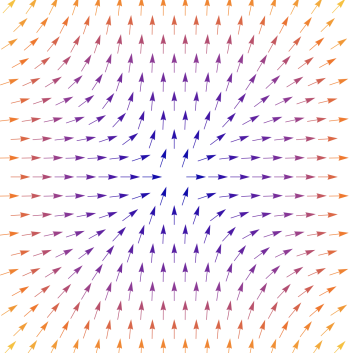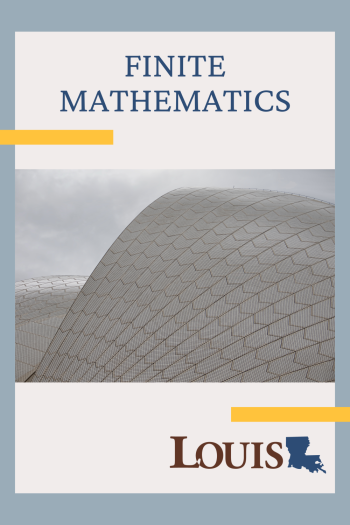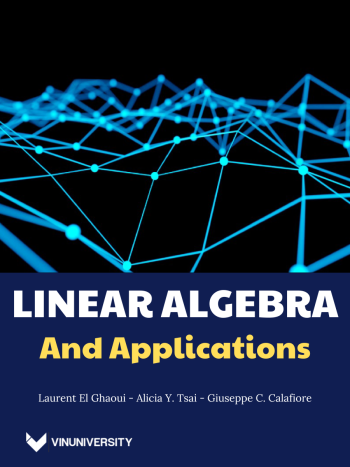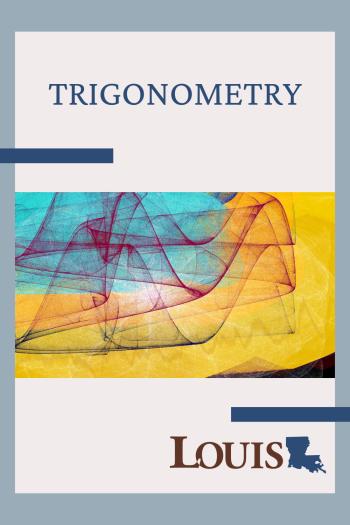
Note: Faculty may have edited the OER specifically for their classes, and the editions given below are the original versions.
 Differential Equations
by
Kuei-Nuan Lin
This book is designed to meet Penn State Math 251 Ordinary and Partial Differential Equations curriculum and course standards. --- First- and second-order equations; special functions; Laplace transform solutions; higher order equations; Fourier series; partial differential equations.
Differential Equations
by
Kuei-Nuan Lin
This book is designed to meet Penn State Math 251 Ordinary and Partial Differential Equations curriculum and course standards. --- First- and second-order equations; special functions; Laplace transform solutions; higher order equations; Fourier series; partial differential equations.
 Finite Mathematics
by
Ashley Segalla; Kiel Ellis; Renae Broussard; and Toni Spahn
This book is designed to be used in any Finite Mathematics course, whether College Algebra is a prerequisite or not. There are sections at the end of Chapters 2, 4, and 8 that use technology to solve problems that are solved in other sections in the chapter. A fun fact about this book is that it was adapted and written by four Louisiana natives who decided to add a bit of Louisiana to the content, examples, and exercises in the book.
Finite Mathematics
by
Ashley Segalla; Kiel Ellis; Renae Broussard; and Toni Spahn
This book is designed to be used in any Finite Mathematics course, whether College Algebra is a prerequisite or not. There are sections at the end of Chapters 2, 4, and 8 that use technology to solve problems that are solved in other sections in the chapter. A fun fact about this book is that it was adapted and written by four Louisiana natives who decided to add a bit of Louisiana to the content, examples, and exercises in the book.
 Linear Algebra and Applications
by
Alicia Y. Tsai; Authors: Laurent EI Ghaoui; Contributors: Phan Hoang, Tony Tin, Ha To Tam, Nguyen Van Kep, Le Dinh Nam, Juliette Decugis, Nguyen Quoc Cuong.; and Giuseppe C. Calafiore
This textbook offers an introduction to the fundamental concepts of linear algebra, covering vectors, matrices, and systems of linear equations. It effectively bridges theory with real-world applications, highlighting the practical significance of this mathematical field. Discover how linear algebra plays a crucial role in various disciplines, such as engineering, physics, computer science, and economics. Emphasizing the development of problem-solving abilities, the book provides abundant exercises and illustrative examples, facilitating a solid understanding of the concepts within linear algebra.
Linear Algebra and Applications
by
Alicia Y. Tsai; Authors: Laurent EI Ghaoui; Contributors: Phan Hoang, Tony Tin, Ha To Tam, Nguyen Van Kep, Le Dinh Nam, Juliette Decugis, Nguyen Quoc Cuong.; and Giuseppe C. Calafiore
This textbook offers an introduction to the fundamental concepts of linear algebra, covering vectors, matrices, and systems of linear equations. It effectively bridges theory with real-world applications, highlighting the practical significance of this mathematical field. Discover how linear algebra plays a crucial role in various disciplines, such as engineering, physics, computer science, and economics. Emphasizing the development of problem-solving abilities, the book provides abundant exercises and illustrative examples, facilitating a solid understanding of the concepts within linear algebra.
 Technical Mathematics, 2nd Edition
by
Morgan Chase
"This developmental-level mathematics textbook is intended for career-technical students." - Works with MAT 104
Technical Mathematics, 2nd Edition
by
Morgan Chase
"This developmental-level mathematics textbook is intended for career-technical students." - Works with MAT 104
 Trigonometry
by
Bimal Kunwor; Donna Densmore; Jared Eusea; and Yi Zhen
This book is designed to be used in any Trigonometry course. The book is useful to students in a variety of programs - for example, students who have encountered elements of triangle trigonometry in previous courses may be able to skip all or part of Chapters 1 through 3. Students preparing for technical courses may not need much of the material after Chapter 6 or 7. Chapters 9 and 10 cover vectors and polar coordinates, optional topics that occur in some trigonometry courses but are often reserved for precalculus.
Trigonometry
by
Bimal Kunwor; Donna Densmore; Jared Eusea; and Yi Zhen
This book is designed to be used in any Trigonometry course. The book is useful to students in a variety of programs - for example, students who have encountered elements of triangle trigonometry in previous courses may be able to skip all or part of Chapters 1 through 3. Students preparing for technical courses may not need much of the material after Chapter 6 or 7. Chapters 9 and 10 cover vectors and polar coordinates, optional topics that occur in some trigonometry courses but are often reserved for precalculus.
Central Maine Community College Learning Commons - 1250 Turner St., Auburn, Maine 04210 - Telephone: (207)755-5218
Central Maine Community College is an equal opportunity/affirmative action institution and employer.
For more information, please call (207) 755-5100. [Full Non-Discrimination Notice]